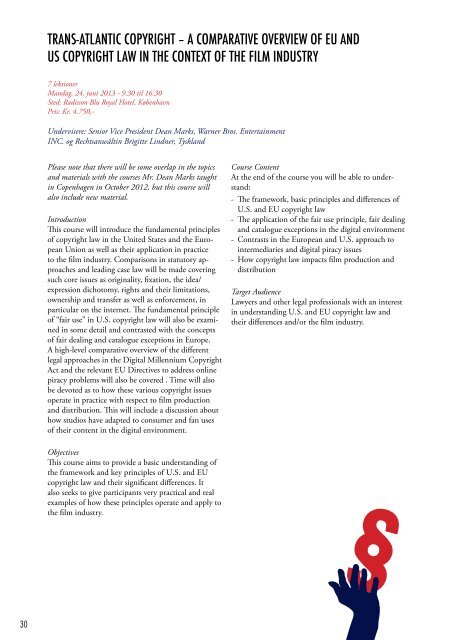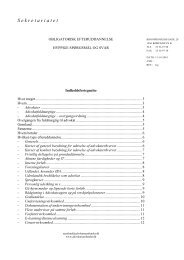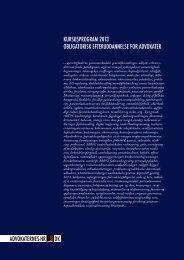Kursuskatalog, udsendt maj 2013 - Advokaternes HR
Kursuskatalog, udsendt maj 2013 - Advokaternes HR
Kursuskatalog, udsendt maj 2013 - Advokaternes HR
You also want an ePaper? Increase the reach of your titles
YUMPU automatically turns print PDFs into web optimized ePapers that Google loves.
30<br />
trans-atlantic cOpyright – a cOmparative Overview Of eu and<br />
us cOpyright law in the cOntext Of the film industry<br />
7 lektioner<br />
Mandag, 24. juni <strong>2013</strong> - 9.30 til 16.30<br />
Sted: Radisson Blu Royal Hotel, København<br />
Pris: Kr. 4.750,-<br />
Undervisere: Senior Vice President Dean Marks, Warner Bros. Entertainment<br />
INC. og Rechtsanwältin Brigitte Lindner, Tyskland<br />
Please note that there will be some overlap in the topics<br />
and materials with the courses Mr. Dean Marks taught<br />
in Copenhagen in October 2012, but this course will<br />
also include new material.<br />
Introduction<br />
This course will introduce the fundamental principles<br />
of copyright law in the United States and the European<br />
Union as well as their application in practice<br />
to the film industry. Comparisons in statutory approaches<br />
and leading case law will be made covering<br />
such core issues as originality, fixation, the idea/<br />
expression dichotomy, rights and their limitations,<br />
ownership and transfer as well as enforcement, in<br />
particular on the internet. The fundamental principle<br />
of “fair use” in U.S. copyright law will also be examined<br />
in some detail and contrasted with the concepts<br />
of fair dealing and catalogue exceptions in Europe.<br />
A high-level comparative overview of the different<br />
legal approaches in the Digital Millennium Copyright<br />
Act and the relevant EU Directives to address online<br />
piracy problems will also be covered . Time will also<br />
be devoted as to how these various copyright issues<br />
operate in practice with respect to film production<br />
and distribution. This will include a discussion about<br />
how studios have adapted to consumer and fan uses<br />
of their content in the digital environment.<br />
Objectives<br />
This course aims to provide a basic understanding of<br />
the framework and key principles of U.S. and EU<br />
copyright law and their significant differences. It<br />
also seeks to give participants very practical and real<br />
examples of how these principles operate and apply to<br />
the film industry.<br />
Course Content<br />
At the end of the course you will be able to understand:<br />
- - The framework, basic principles and differences of<br />
U.S. and EU copyright law<br />
- - The application of the fair use principle, fair dealing<br />
and catalogue exceptions in the digital environment<br />
- - Contrasts in the European and U.S. approach to<br />
intermediaries and digital piracy issues<br />
- - How copyright law impacts film production and<br />
distribution<br />
Target Audience<br />
Lawyers and other legal professionals with an interest<br />
in understanding U.S. and EU copyright law and<br />
their differences and/or the film industry.<br />
legal lObbying at the eu and<br />
natiOnal level<br />
7 lektioner<br />
Mandag, 25. november <strong>2013</strong> - 9.30 til 16.30<br />
Sted: IDA Mødecenter, København<br />
Pris: Kr. 4.750,-<br />
Underviser: Professor Alberto Alemanno, HEC Paris<br />
Introduction<br />
This course aims at familiarising the participants with<br />
the European public sphere, by focusing on both its<br />
institutional settings and the decision-making process<br />
leading to the adoption of European legislation, such<br />
as regulations, directives and decisions.<br />
This will be a dynamic and interactive one-day<br />
training course introducing to the main legal lobbying<br />
techniques and strategies to be used both at<br />
the EU and national level. After introducing the<br />
main features of the EU decision-making process, by<br />
focusing on the little-known ‘comitology procedures’<br />
(responsible for the adoption of more than 2000<br />
EU legal acts per year), it will focus on some of the<br />
emerging analytical tools systematically used in both<br />
national and EU policy-making, such as regulatory<br />
impact assessment and its main components (problem<br />
definition, policy options, risk assessment and<br />
cost-effectiveness studies).<br />
Course Content<br />
- - Master the European decision-making process and<br />
the interface between it and the national member<br />
states’ political systems<br />
- - Understand how and by whom European legislation<br />
is made in Europe<br />
- - Analyse and discuss contemporary issues of EU law<br />
and policy, such as impact assessment, new comitology<br />
and cost-benefit analysis.<br />
Target audience<br />
Lawyers and other non-legal professionals who need a<br />
sound introduction to lobbying techniques at the EU<br />
and national level.<br />
fOOd law - an intrOductiOn tO eu<br />
and internatiOnal fOOd law<br />
7 lektioner<br />
Tirsdag, 26. november <strong>2013</strong> - 9.30 til 16.30<br />
Sted: Radisson Royal Blu Hotel, København<br />
Pris: Kr. 4.750,-<br />
Underviser: Professor Alberto Alemanno, HEC Paris<br />
Introduction<br />
This training session aims at familiarising the participants<br />
with food law as an autonomous area of legal<br />
practice within the broader framework of both EU<br />
and WTO law.<br />
Objectives<br />
At the end of this course, you should be able to understand<br />
the overall EU framework aimed at ensuring<br />
both the safety and the quality of food products<br />
within the broader framework of global food law.<br />
Course Content<br />
The session will offer a presentation of the actual state<br />
of play of EU Food Law, by analysing in particular<br />
the general principles and requirements set out by the<br />
General Food Law Regulation (EC) No 178/2002.<br />
This includes an overview on the evolution of the EU<br />
Food Law as well as an explanation of the following<br />
aspects:<br />
- - The application of the risk analysis framework<br />
- - The food safety requirements<br />
- - The precautionary principle in food law<br />
- - The general requirements regarding the labelling<br />
and presentation of foodstuffs as well as an overview<br />
of the emergence of global food governance (WTO,<br />
Codex, etc).<br />
Teaching Method<br />
This course will be highly interactive and possibly<br />
entertaining. It will be based on a combination of<br />
lectures, brain storming sessions and case studies that<br />
will be handed down to the participants from session<br />
to session.<br />
Course Work<br />
The course follows a seminar format and the participants<br />
are expected to have covered the reading in advance.<br />
Participants will rely on a syllabus containing<br />
some readings, which will be provided at the beginning<br />
of the course. Participants are also expected to<br />
actively participate in class discussions, debates, group<br />
presentations and individual presentations.<br />
31




